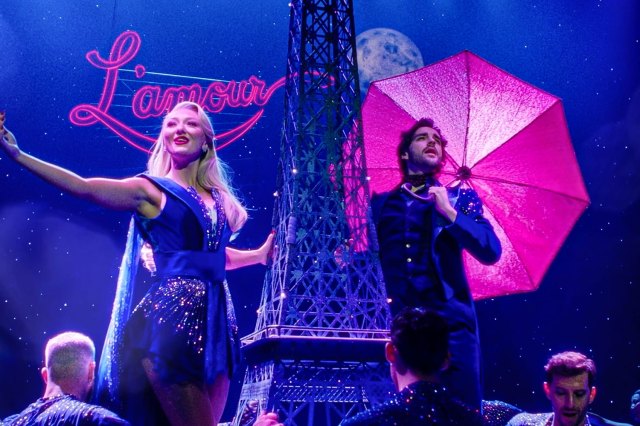Merrily We Roll Along (Derby)
The opening scene could be Singin’ in the Rain transposed to the 1970s: a party celebrating a new movie, shining with false bonhomie and the sour smell of success, complete with vitriolic passed-over leading lady determined to humiliate her successor.
Merrily We Roll Along is full of tantalising echoes of the great Gene Kelly film, but Stephen Sondheim (with George Furth’s book) adopts the radical strategy of telling the story backwards, from 1976 back to 1957. While working within the Broadway/Hollywood tradition, he is thus able to subvert its clichés and to bring into sharp focus the poignancy of lost ideals, broken friendships and faded loyalties.
The basic story-line is familiar, except that happy endings don’t intrude. Writer Charley Kringas and composer Frank Shepard collaborate on original off-centre revues, encouraged by (briefly best-selling) author Mary Flynn, all three devoted friends from their early 20s, with Mary’s love for Frank invisible only to its object. Through the years Frank, unfaithful to every ideal, partner or wife, prospers while Charley, now an intellectual playwright, is banished from the sycophantic Shephard circle and Mary contributes an alcohol-soaked commentary on Frank’s failings.
Karen Louise Hebden’s superb production brings out all its bitter-sweet appeal via a sort of understated spectacle. She deploys a cast of 13, a six-piece band (Andrew Synnott’s reduction of the score still having plenty of impact), a revolving stage and video projections of contemporary events, joys past or diary entries, but the production is never strident and Dan Potra’s designs are unafraid of empty space.
A fine ensemble is full of well-judged and well-sung performances (notably from Julie-Alanah Brighten and Cheryl McAvoy as Frank’s two wives) and the three central performances are outstanding, vocally and dramatically. The fixed smile of self-absorption and self-disgust thaws, but Glyn Kerslake’s Frank remains detached from everything except his own ambition.
Glenn Carter as Charley begins as an embittered Donald O’Connor, tearing off a vocal tour de force denouncing Frank’s avarice, but melts into wide-eyed optimism, while Eliza Lumley manages the most striking transformation of all, from drunken middle-aged wit to youthful innocent, delighted to discover two great talents in the next apartment.
Clever as it is, in everything from its structure to the brilliant pastiches that contrast with the conversational rhythms of most of the songs, Merrily We Roll Along is also very moving, ending in the beginning with an almost unbearable fusion of optimism and disillusion, as the three friends serenade the future while Sputnik whirls overhead.
– Ron Simpson












